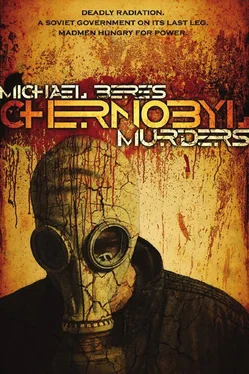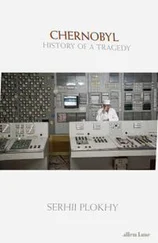Michael Beres - Chernobyl Murders
Здесь есть возможность читать онлайн «Michael Beres - Chernobyl Murders» весь текст электронной книги совершенно бесплатно (целиком полную версию без сокращений). В некоторых случаях можно слушать аудио, скачать через торрент в формате fb2 и присутствует краткое содержание. Жанр: Триллер, на английском языке. Описание произведения, (предисловие) а так же отзывы посетителей доступны на портале библиотеки ЛибКат.
- Название:Chernobyl Murders
- Автор:
- Жанр:
- Год:неизвестен
- ISBN:нет данных
- Рейтинг книги:4 / 5. Голосов: 1
-
Избранное:Добавить в избранное
- Отзывы:
-
Ваша оценка:
- 80
- 1
- 2
- 3
- 4
- 5
Chernobyl Murders: краткое содержание, описание и аннотация
Предлагаем к чтению аннотацию, описание, краткое содержание или предисловие (зависит от того, что написал сам автор книги «Chernobyl Murders»). Если вы не нашли необходимую информацию о книге — напишите в комментариях, мы постараемся отыскать её.
Chernobyl Murders — читать онлайн бесплатно полную книгу (весь текст) целиком
Ниже представлен текст книги, разбитый по страницам. Система сохранения места последней прочитанной страницы, позволяет с удобством читать онлайн бесплатно книгу «Chernobyl Murders», без необходимости каждый раз заново искать на чём Вы остановились. Поставьте закладку, и сможете в любой момент перейти на страницу, на которой закончили чтение.
Интервал:
Закладка:
When the firing in the room finally ceased, gun smoke billowed out the doorway, a few shells rolled into the hallway, and Komarov ran into the room with Brovko.
Their two men were prone on the floor, their machine pistols aimed at a sofa against a window. Bits of what looked like plaster were scattered about the men’s feet. One man on the floor pointed to the sofa, the other pointed back behind the door. The men from the stairwell joined them, crowding into the room. Brovko aimed his pistol behind the door before shaking his head sadly and turning to the sofa.
Behind the door Komarov saw a statue with a pistol fastened to its hand. On the bed was another pistol in a shoulder holster. He aimed his own pistol at the sofa with the others.
“Come out, Horvath!”
When a shot exploded from behind the sofa, Komarov, along with the others, opened fire.
The firing continued at least five seconds. When it stopped, the sofa was smoking, tufts of stuffing floating above it.
Brovko approached the sofa carefully, aiming his pistol. Once behind and to the side of the sofa, he looked back to Komarov.
“There’s nobody here.”
“What?”
“But he jumped back there,” said one of the men on the floor.
Brovko shoved the sofa out into the room.
“The window!” screamed Komarov.
“We’re on the seventh floor,” said one of the men.
Another man was at the bathroom door, pushing it open, aiming.
Komarov already knew there would be no one in the bathroom.
He saw water flecks on the tile floor and trailing across the carpet to the window. Both he and Brovko ran to the window and looked out. Below the window a platform swung gently. On the platform, in the light from a window below, Komarov could see more droplets of water. Along with the sulfurous scent of burnt gunpowder, there was a scent of perfume in the air.
“Hurry!” shouted Komarov, running from the room. “They’ve gone down a floor!”
Brovko screamed into his handheld transceiver, telling the men on the street to circle the building. Komarov did not bother with the elevator. He ran to the stairwell and, when he entered it, heard the echo of a door slamming below.
Lazlo’s ankle was on fire as he ran. When he put on the white waiter’s jacket, blood smeared the sleeve, and he realized he had cut his wrist on the scaffold. His left side ached where he shoved the pistol into his belt beneath the jacket before running through the hotel kitchen.
Several kitchen workers stared at him. One, a fat man in a chef’s hat, stepped to the center of the aisle to block his path. Lazlo pulled up his sleeve, held out his bleeding wrist, and said, “I’ve cut myself,” and the man stepped aside.
He ran down the outside metal stairway and through the alley as fast as he could. He tried to ignore the pain, but it was more intense with each step, as if an animal were inside chewing his an-klebone. The alley exited at the side of the building on the street bordering Lenkomsomol Square. He ran across the street. There was a shout behind him.
“Stop!”
He ran onto the sidewalk as fast as he could, but the man behind was faster, and was joined by a second man, the two shouting encouragement to one another in Russian, young men running fast, so fast. The pain, how long could he run with the pain?
When he rounded a corner, a crowd making their way down the street from the Philharmonia confronted him. He dodged one person after another, shouting, “Watch out! Move over!” Behind him he heard the two men doing the same as they rounded the corner. The white jacket was like a flag as he ran among people coming from the concert in dark formal wear.
A restaurant ahead, patrons going in, a crowd. He went through the doorway, pushing a man and a woman aside. The man cursed him in Ukrainian and Russian.
Through the dining room, pushing a dessert cart out of the way.
He found the kitchen door at the back just as he heard the commotion at the front entrance. In the kitchen he removed the white jacket, knocked over a man standing on a stool, then ran into a cart full of pots and pans, which spilled over, some of the pans bouncing ahead and underfoot. Near the back door, there was a black overcoat on a hook. He took it and ran out the back door.
The alley was dark and quiet, but through the door he could hear a man shouting, “Hey! Stop! My coat!”
Lazlo tipped a heavy garbage can against the door, put on the overcoat, and took out his pistol. There was a loud racket in the kitchen. He crouched down behind another garbage can and aimed his pistol at the garbage can leaning against the door. When the door pushed outward, he fired two shots. When the door was pushed closed by the garbage can, he ran past the doorway in the opposite direction and found a gangway out to the street, where he joined a crowd of people walking slowly back to the Hotel Dnieper.
The people chatted about the concert, one woman saying Prokofiev was “elevating,” a man saying the music was “overly West-ernized.” Lazlo put up the overcoat collar, which smelled of onions.
He put his hands in the pockets, his right hand still gripping his pistol. He walked as smoothly as he could despite the pain in his ankle.
He was rounding the corner back to the hotel when he heard footsteps run up the gangway. Once around the corner, he ran again.
Across the street from the hotel he slowed to a walk. There were at least five KGB men outside the main entrance, looking about in all directions. He had caught up to a group of four people leaving the concert, but they veered to the right and began crossing the street to the hotel. Lazlo walked straight ahead to the end of the block and onto the lighted pathway leading to Lenkomsomol Square. He wished he had gone the other direction to the metro, but there had been no crowds going that way. He could not turn around now because he could hear the men who had chased him through the restaurant back at the corner.
The men at the hotel entrance began spreading out, one coming toward him, but not running. The man paused before crossing the street to allow a speeding taxi by. There was something familiar about the man, something about the shape of his head, his receding hairline. Suddenly the man stopped short and shouted, “Horvath!” and Lazlo knew it was Komarov.
Running. The pain again. Running out onto Lenkomsomol Square. Nowhere else to go. All these men chasing him, and nowhere to hide. All these men led by Komarov a hundred meters behind. Would he be shot through the head like the deserter from the Romanian border? Perhaps he deserved it.
A shot fired, causing a young couple ahead on a bench to dive to the ground. If only he could stop running. If only he could become invisible. But what would happen to Juli? What would happen to Juli if he did not return?
As he ran farther out onto the square, he heard a violin playing in the distance, a violin playing a Hungarian prima, the violin crying its song into the night, a song he recognized, a song called,
“If Someone’s Sad.”
Another shot, a piece of stone on the square set free, skittering beneath his feet. The violin stopped playing. Only the pain remained, and Juli waiting for him.
The footsteps behind were like marbles bouncing on the paving stones. The men closer, perhaps seventy-five meters back. Ahead, the few strollers who had been in the distance were gone, crouched down behind planters and statues, waiting for these insane men to disappear.
A sound. He had run past a sound below. A truck shifting gears. The underpass! The road beneath Lenkomsomol Square!
The road branching from the traffic-signaled intersection near the square! One summer he had reprimanded boys for dropping stones from the planters through the drainage grates onto the traffic below.
Читать дальшеИнтервал:
Закладка:
Похожие книги на «Chernobyl Murders»
Представляем Вашему вниманию похожие книги на «Chernobyl Murders» списком для выбора. Мы отобрали схожую по названию и смыслу литературу в надежде предоставить читателям больше вариантов отыскать новые, интересные, ещё непрочитанные произведения.
Обсуждение, отзывы о книге «Chernobyl Murders» и просто собственные мнения читателей. Оставьте ваши комментарии, напишите, что Вы думаете о произведении, его смысле или главных героях. Укажите что конкретно понравилось, а что нет, и почему Вы так считаете.












